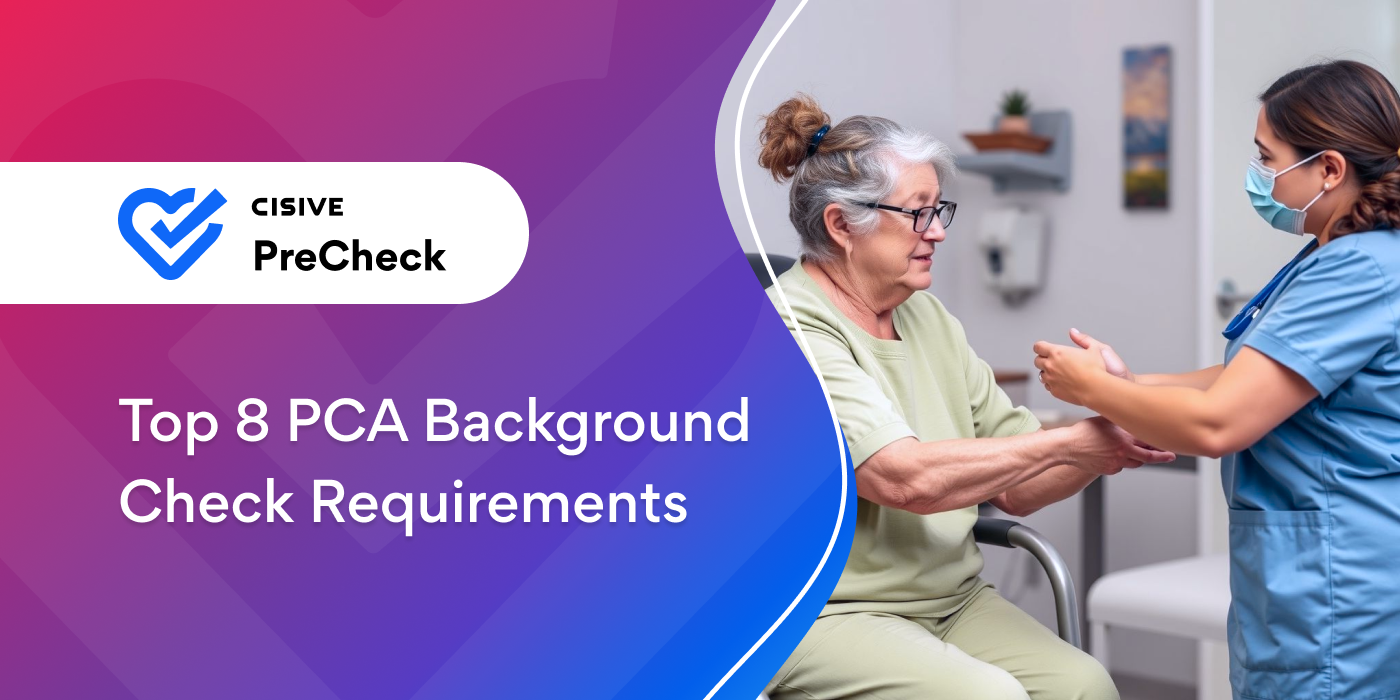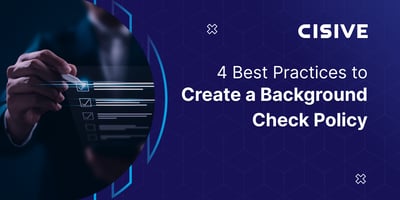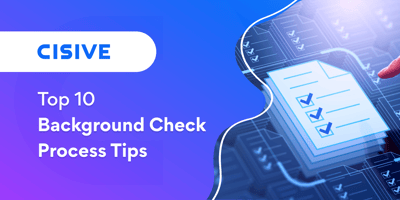

As an HR or talent management pro, you know background checks are valuable in protecting your...

Personal care assistants, or PCAs, are vital to providing comprehensive care for patients. They perform a variety of tasks, including everything from personal hygiene help to mobility support, and work intimately with those they care for.
You want to make sure you are hiring PCAs who can provide safe, quality care. But there is no national standard for licensing for PCAs. So, how can you know if you're hiring someone competent and qualified?
There is no guarantee. However, conducting thorough background checks for PCAs is one vital way to perform due diligence in your hiring process. PCA background checks can help maintain the safety of your clients and protect your organization from potential risk.
Below, you'll learn about the essential components of a PCA background check and how to implement an effective screening process. We'll cover the types of checks required, legal considerations, and best practices for maintaining compliance with industry regulations. By following these guidelines, you can build a reliable team of caregivers and provide high-quality care to your clients.
Key TakeawaysHere are the key things you need to know about PCA background checks:
|
A PCA background check verifies the qualifications and history of personal care assistants. It includes checking for criminal records, verifying their educational training, and confirming previous employment. A comprehensive screening process allows you to verify a candidate's qualifications before making a hiring decision.
Conducting thorough background checks helps you keep a safe environment for staff and patients alike. A comprehensive background check ensures that PCAs have a clean record and the necessary skills to provide quality care. Plus, it helps you maintain compliance with industry standards and protect your organization from liabilities.
Home care agencies rely heavily on background checks to ensure patient safety and maintain regulatory compliance.
Background checks are essential for organizations that provide direct care to vulnerable populations. These include nursing homes, assisted living facilities, and home health services. Healthcare providers use background screenings to verify the qualifications and trustworthiness of personal care assistants before hiring.
The Department of Health and Human Services, state agencies, and other regulatory agencies mandate background checks for home care providers. Hospitals, rehabilitation centers, and community health organizations also require comprehensive screenings.
These checks help protect clients, maintain professional standards, and reduce potential liability risks for organizations.
Background checks check every place they need to help ensure that candidates meet the requirements for their roles.
Some confirm their competency and skillset, like verification of professional licensing, training, certifications. This also covers their student or education history and their employment history. Immunization records and drug screenings both ensure they can safely work with patients.
Another aspect of background checks is to ensure they don’t have any past offenses that would prohibit them from working with vulnerable populations. Examples of these are criminal background checks and reviews of abuse or neglect registries.
Other checks may include driving records and financial histories, particularly checks of Medicare or Medicaid fraud. A thorough evaluation protects your business and clients by helping you hire trustworthy caregivers.
PCA background checks are generally required by law and industry standards. Home health agencies, nursing homes, hospitals, and other healthcare providers typically require comprehensive background checks to ensure patient safety and comply with regulations.
All PCAs must pass a national criminal background check before starting work. However, specific requirements can vary by state and organization. Some states mandate fingerprint-based checks in addition to the checks mentioned above.
Check your local laws and organizational policies to make sure you're meeting all requirements for PCA background checks.

A comprehensive background check involves looking into an applicant’s professional and criminal history and assessing their qualifications. If you use a background check service like Cisive’s PreCheck, the results will come back in a comprehensive report. Use the report to determine if you want to continue with the hire or take adverse action.
The information comes from multiple sources. Identity verification is done using government-issued IDs, like a driver’s license or passport. Driving records are obtained through state departments of motor vehicles.
Criminal records are accessed through state and federal databases, often using fingerprint-based searches. These include FBI databases and state law enforcement systems.
Employment and education verification involves contacting previous employers and academic institutions directly. Health departments or other state agencies can confirm the validity of professional certifications or training. You may also request immunization records directly from the applicant.
Run PCA screenings at least once a year for all staff. An annual check ensures that your staff members are qualified, free from new criminal activity, and up to date on licenses and vaccinations.
Some states may require more frequent checks, especially if there are specific incidents or changes in regulations. Also, checks should be conducted whenever a PCA changes positions or when there is a gap in employment.
PCA background checks involve a step-by-step process to verify a candidate’s qualifications. First, you’ll obtain written consent from the candidate to conduct the check. That will allow you to access their criminal history, employment records, and other relevant information.
You’ll also verify the candidate's identity, check for any criminal convictions, and confirm previous employment and education. Some states also require fingerprinting, which is sent to law enforcement agencies for a thorough review. After completing the checks, you will receive a report detailing the findings.
If you don’t want to do all this manually, you can use a background check service to perform most of the tasks for you.
Background checks are regulated and, as such, are required to hire personal care assistants. To stay compliant with these regulations, you must perform the following checks.

PCA background checks protect your clients and organization from employees who are either unqualified or unsafe. When you screen candidates, you reduce risks, maintain compliance with regulations, and build a reliable team that provides high-quality care.
Screening candidates helps you identify individuals who may present a safety risk. Criminal checks, reviews of abuse registries, and drug screening tests all help you hire caregivers who don’t have a history of harming themselves or others.
By conducting these checks, you create a safer environment for both clients and staff. A safe environment instills confidence and allows your team to move forward without fear of working with volatile individuals.
Federal laws, such as those governing Medicare and Medicaid, require thorough screenings to make sure caregivers meet legal standards. Many states also mandate criminal, abuse registry, and OIG exclusion list checks for personal care assistants.
By conducting these checks, you avoid penalties and protect your organization from legal risks or fines. Regular or ongoing screenings ensure that your employees stay eligible to work in federally funded programs.
Screening candidates helps you identify individuals with a history of criminal behavior or misconduct. You avoid hiring someone who could harm patients or create unsafe situations. Being proactive with a comprehensive check minimizes potential liabilities and safeguards both your patients and your organization.
If you don’t perform adequate screenings, you haven’t done your due diligence. If an incident occurs, it could lead to fines or lawsuits. Having dated records showing that you conducted proper background checks can protect your organization from legal repercussions.
You can verify education, certifications, and previous employment to confirm that candidates have the necessary skills and training to provide quality care. In addition to the state training required, you can check whether they have CPR or first aid training.
A thorough vetting process helps you select individuals who can meet the specific needs of your clients. When you hire qualified and competent PCAs, you enhance the quality of care provided to patients and create a safer environment for everyone involved.
A PCA background check helps reduce staff turnover by helping you hire qualified, reliable candidates from the start. You’ll be able differentiate those with the right skills, experience, and character for the job. You’ll also avoid hiring individuals who may not be suitable for the role, which can lead to costly early departures or terminations.
Plus, by screening out applicants who are potentially problematic, background checks help create a safer work environment. When employees feel safe and work alongside competent colleagues, they’re more likely to stay with your organization long-term.
Cisive's PreCheck platform offers a single, unified system for all your screening needs. Get permission from the applicant through the system, then select which background checks you’d like to run.
Instead of running individual checks manually, you can run all the tests you need at once. With real-time updates, you can easily see which checks are complete and which are still in progress. When completed, you’ll receive clear results with 99.9% accuracy to help you have confidence in the applicant you hire.
PreCheck allows you to find out everything you need to protect your organization from making bad hires. You can screen incoming candidates and find out about their criminal history, work experience, certifications, licensing, and anything that may prohibit you from hiring them.
The platform also streamlines and simplifies your processes so you can perform background checks faster and with greater accuracy. Contact Cisive today to speak with a PreCheck expert or get a demo. Let us help you build your team one background check at a time.

As an HR or talent management pro, you know background checks are valuable in protecting your...

Comprehensive background checks can alert employers to potential issues with prospective...

Employees are the heart of your company. Their salaries and benefits are also most companies’...